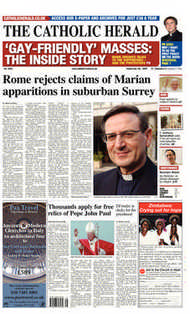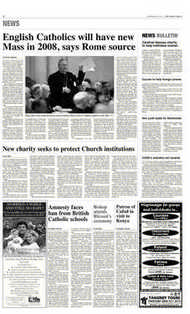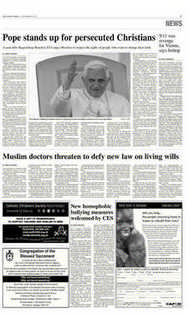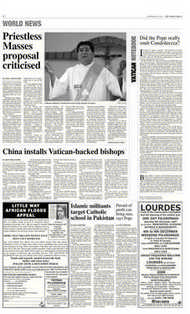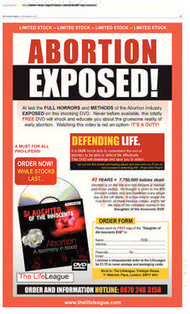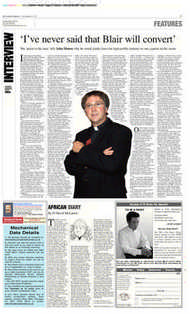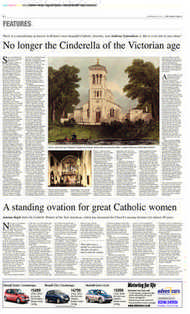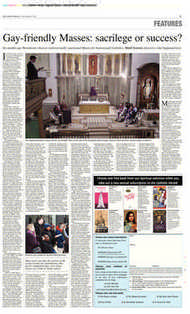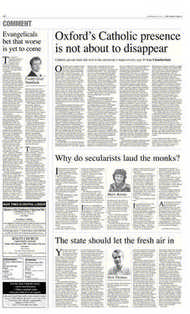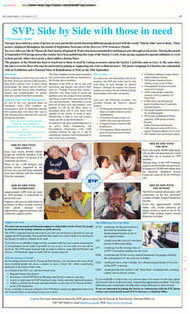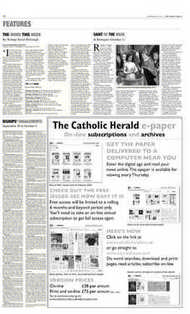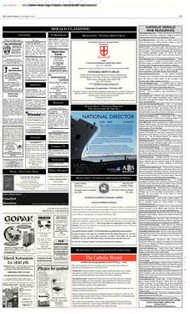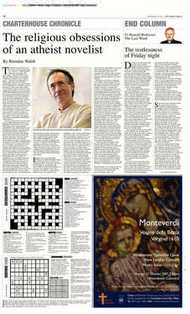Page 7, 28th September 2007
Page 7

Report an error
Noticed an error on this page?If you've noticed an error in this article please click here to report it.
Tags
Share
Related articles
Tony Blair: No Longer Two Different People?
Uncertain Future For House Of Cardinals
Who Wants A Zombie For A Curate?
With A Celebrated Piece Of Stone
Outlining A Priest's Job
`the Media Treat Benedict Xvi Unfairly'
‘I’ve never said that Blair will convert’
The ‘priest to the stars’ tells John Hinton why he would gladly leave his high-profile ministry to run a parish on the moon In the long, formal dining room of Clergy House behind Westminster Cathedral, a genial Fr Michael Seed pours out a black coffee and confides that among his ambitions is to fly to the moon and open the first Catholic parish there. Why ever not? If it can be done, Fr Seed would be the natural choice to do it, spreading the faith in the spirit of St Francis of Assisi.
Look up into the night sky and you might catch the Man on the Moon laughing at the idea. And Fr Seed, a Franciscan friar, is all for that. He laughs and jokes a lot, but insists that once voyages to the moon become available he has every intention of making appropriate inquiries at NASA.
“It’s a very Franciscan thing to do,” he explains, citing St Francis’s references to “Brother Sun” and “Sister Moon”. “I could see going to the moon as a Franciscan calling.” Now 50, Fr Seed celebrated 25 years of vows in January this year, 23 of those serving the Cathedral. As we meet, he says he is “extremely content and happy”, but also admits to being “very much aware of the generosity of my superiors, that the door hasn’t opened yet – with me thrown out”.
His relationship with the Church hierarchy has sometimes been strained by his informal approach, and a certain talent for converting luminaries to Catholicism which earned him the sobriquet “priest to the stars”. He regards as a sea change the conversion of Ann Widdecombe in 1993, supposed to be done very discreetly early one morning in the hush of the Cathedral’s crypt. But any mist of secrecy soon cleared.
“Ann was received into the media,” he recalls. “I think she was also received into the Roman Catholic Church, but that morning she was much more received into the media. And that’s because it was her, and also because she was the first minister to become a Catholic since Mary Tudor. And then just a few months after that, you had John Gummer and others.” He now views his own personal history in terms of preand post-Ann Widdecombe.
At first amused, Cardinal Hume became concerned. “This was the period, from 1988 to 1998, when hundreds and thousands of people were becoming Catholic for all kinds of reasons, but I wasn’t stupid enough not to realise that it was causing concern to one’s elders and betters. And it was. And I was getting the brunt of it.” Here, no doubt, was the origin of his legendary rows with Cardinal Hume.
“Father Hume used to shout at me in a most unsaintly way. We were once found shouting at each other in the safe in the archbishop’s house. He was making so much noise that I opened the safe door and took him in, where we continued the argument.” Laughing at the memory, he sips his coffee, looking quite at peace with himself. But look at all those converts, I venture. Surely nothing succeeds like success?
“Yes, but I can’t see it as success, like a Wild West fighter having notches on his gun. We’re not in those realms.” Fr Michael clearly doesn’t want his epitaph to be that he brought the famous into the fold.
Indeed, he is still furious about an erroneous report in a leading national newspaper that he had converted Tony Blair shortly before the Prime Minister left Downing Street. He asked me to record this very clearly so he could nail the lie once and for all: “I have never ever said in my life that Mr Blair is going to become a Catholic. It is important to say it. If anyone comes to see me about becoming a Catholic, I am not going to say anything. It’s like seeing your GP.” He was already seeking to temper the impression that he was an “ace” converter when he published an article called “Not every face need fit” last year, which caused many people to consider that not everyone is ready for or suitable for conversion to Catholicism.
Then came the publication in June this year of his memoirs, Nobody’s Child, an account of his tragic childhood in a Manchester slum. Born to an unmarried teenage mother, he was given up for adoption as a baby into a kind of hell on earth. His stepfather’s merciless beatings were to drive his adoptive mother to suicide under the wheels of a train when he was just eight. For the next five years he would suffer the same beatings, and often lay his young head down on the same cold track, waiting for the rumble of the train and hoping to die and be delivered from the unending daily torture. But each time – and in the nick of time – he scrambled away to safety. He then survived being shuffled between families, a school for maladjusted children and dismissal from various menial jobs. After a long and hard journey, he joined the Franciscans and, after training and ordination in America, became a chaplain at Westminster Hospital – before becoming ecumenical adviser to Cardinal Hume. His progress has, in short, been incredible.
“The book really compounds things,” he argues, “because it shows that, as well as going on about converts all the time, I am also a strange character who has had an interesting life. The other part of my life – the childhood and coping with it, suicide and suicidal tendencies – is more interesting than Ann Widdecombe or Blair or whatever. It’s more helpful to people because it’s a story of survival, that’s why I wrote it. It takes away from some of the silliness of only being associated with converts or aspects of triumphalism.” Yet was he happy to have laid bare such pain and detail about his personal life?
He hesitates. “No. But I did it.” A pause. “And it’s done.” Nobody’s
Child has been well-received at home, where it reached number 20 in the bestseller list soon after publication. “All the clergy here have been very understanding and sensitive, but that’s not the same everywhere. Some have said the book should never have been written; it’s a very graphic book.” The book is also causing a lot of interest in the United States. “I’ve had 200 letters, some of them very beautiful.” Fr Seed’s commitments include working with The Passage, the largest homeless centre in Britain, which caters for more than 200 people each day, offering food, medical, dental and psychiatric help, laundry facilities, computer and drama classes, and counselling of all kinds. At night the centre can sleep 60, but the idea is to help people to cope and move on. “The whole point is not to keep people there but get them back into the world. It’s an amazing system,” he says. To help pay for its £2.5m annual running costs, the centre runs a big charity show each year called “A Night Under the Stars”, or Nuts for short – a reference not only to sleeping rough, but to the showbusiness names like Rory Bremner and Roger Moore who donate their time and talent. To help with ongoing fundraising, The Passage also receives corporate help from firms such as Barclays Bank and accountants KPMG, which assign qualified staff to donate full working days to help run the centre.
Fr Seed has qualms about some aspects of charity and fundraising. “The best giving in my own experience is done in secret and with no fuss at all. But I think we have turned giving into a profession and you actually now have people who are full-time fundraisers. I have met many and am quite shocked, actually. Some of them are fantastic, but the ones I really like are those who are not in it for the money, but are motivated by what they are doing, who have almost a sense of vocation. I can tell the difference immediately.
“I have met many, many fundraisers over the years and they come for a chat, and I can tell instantly what the motivation is: whether they really are concerned about the particularly charity they’re with, or if they’re basically just concerned with the bonus. Some are on commission – and the amount is incredible.” On the subject of charity, we had originally planned to talk about St Francis of Assisi, whose feast is celebrated on October 4, and who Fr Seed considers to be the personification of the Catholic Church.
Wasn’t St Francis mocked by his friends for giving everything away?
“Yes, and the ultimate demonstration of his wishing to relinquish everything is a dramatic scene in the main square of Assisi, with the bishop running out and the crowds gathering, and his father coming running over – when, of course, Francis takes all his clothes off and throws them at his father, because his father is extremely manipulative. Francis is the only child, the heir to the empire of the wealthiest people in Assisi and he is just rejecting it all.
“This, of course, infuriates his father – which is understandable. In a way, one feels sorry for his father because everything he has worked for is lost, all the money, the empire, the dynasty, everything.” So what lessons can we draw from St Francis’s life?
“Number one – not to take life too seriously: to try and have a sense of humour and a sense of happiness, which he always radiated. He was a poet, a musician, a leader of the gang of young people at the time. He never renounced being funny and being playful, didn’t become dull, but he re-directed his joy to the end of life or to the end of time.
“So the beauty of St Francis is the consecration of every second, of every breath, to something that is beyond this life. In a sense St Francis is a Buddist; he takes a philosophy where one is striving entirely for the light, to search every day for greater and greater enlightenment, which we can never have; we can never have that as a tool until we meet this particular love. But it’s to see this life as merely a veil, as that which is not perpetual, that it really is transient. In the midst of life, we are in death.
“The beauty of St Francis’s philosophy and teaching is the crib and the Cross; the crib to the Cross and the Cross to the crib. And the beauty of Christmas is terror, evil and immense tragedy. In this morbid and unhappy sense, it is about poverty, hopelessness – there are thousands of babies being executed by an insane king – but there is hope: the God to be born. That’s the reality of the birth of God. And St Francis is playful and joyful, and Christmas is happy, because this is the arrival of God. But if you want, the spark of Our Lord’s death is there; it’s embedded in the crib.” To Fr Michael, the story of St Francis speaks of the value of faith and persistence. The cardinal who had championed him became pope – and that’s how Francis was allowed to become effective in what became the largest order in Christendom.
“We’re talking here about the age of 20 or 21 – he only lived until he was 43 – and in his own lifetime the Franciscan friars arrived in Glasgow, Edinburgh, Canterbury, Oxford and Cambridge, which was quite incredible progress. And he was able to sort out the Crusades; as we know, he’d become a friend of the Sultan.” After Francis’s year-long walk into the war zone in 1219, and his plea to a Christian commander to show mercy, the Sultan was so impressed that he declared he’d become a Christian himself were they all like St Francis. “These were most miraculous happenings,” Fr Seed says.
And as told by a man who has demonstrably struggled through the darkness into light in his own life, and now helps bring light and hope to many, these stories retain their impact. As Cardinal Hume famously used to tell his colleagues: “If we didn’t have Fr Michael, it would be necessary to invent him.”
blog comments powered by Disqus


